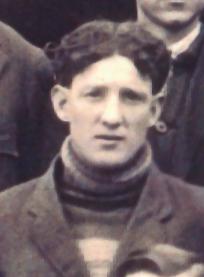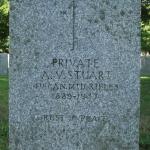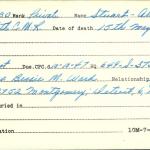BX June 28, 1916
A telegram was received from Ottawa this morning by Mrs. Thomas Stuart, 142 Alfred Street, stating that her son Trooper Albert Victor Stuart had been missing since June 8. Trooper Albert Stuart enlisted with the 4th C.M.R. and left here early in the beginning of the war. He was with Lt. Harvey Cockshutt’s squadron with whom he left for overseas, his commanding officer also being missing. Previous to enlistment Trooper Stuart, who is a single man, 26 years of age was employed as a coremaker at the Goold, Shapley and Muir plant here. Four brothers are also on active service. William of the 19th Battalion, and Jack of the 4th Battalion being in France, Stanley with the 125th Battalion and Charles with the 215th Battalion.
BX July 3, 1916
Is a Prisoner
Trooper Albert Stuart, 4th C.M.R., reported missing a few days ago, is a prisoner of war in Germany. This morning his mother, who resides at 142 Alfred Street, received a card from him stating that he was a prisoner at Dulmen, Westphalia, Germany.
BX September 19, 1918
Is Transferred
Private Albert Victor Stuart of this city, who has been a prisoner in Germany for some time at Minden, is officially reported to have been transferred to Friedrichsfeld bei Wesel. Pte. Stuart is a brother of Postman Alfred Stuart and has made two endeavors to escape from the Hun captivity. Another brother was today reported killed.
BX December 9, 1918
The little yellow envelopes are bringing new messages now, news of joy. One was delivered to Mrs. Thomas Stuart, 181 Sheridan Street, Saturday morning, telling her that her son, Pte. Albert Victor Stuart was safe in England, after being a prisoner in a German camp for two years and five months. Pte. Stuart was a member of the 4th Canadian Mounted Rifles, and he was taken prisoner on June 2, 1916. The last letter received from him just came Saturday morning too, a letter and a card. Pte. William Stuart, his brother, is at Buxton hospital; another brother, Private Jack Stuart, is at Newmarket hospital, and Pte. Stanley was killed in September.
BX December 11, 1918
In the list of casualties issued from Ottawa this morning Albert Victor Stuart, Brantford, is among the prisoners repatriated from Germany, While Charles Arthur Taylor, 393 Colborne Street, is among those wounded.
BX January 31, 1919
Prisoners of War Repatriated, Reach Home – Privates Albert Victor Stuart and Percy Russell Mead were in Hun hands
Tell of Brutality
Some 18 Brantford boys, who crossed the Atlantic on the giant liner Aquitania arrived home yesterday afternoon. Among the lads arriving and who received an especial welcome from their families and friends were Private Albert Stuart and Pte. Percy R. Mead, both of whom had been prisoners in Germany and who got out of that country directly after the armistice was signed. Private Stuart endeavored to escape to less than three times being nailed every time. The first attempt was the most successful, Pte. Stuart being caught 200 yards from the border of Holland. On his other two attempts he got across the river.
Private Stuart was taken prisoner at Sanctuary Wood, June 2, 1916. He was wounded in the arm and in the eye. He remembered seeing Lieut. Harvey Cockshutt very well, and was probably the last man to see this well known Brantford officer, who doubtless gave up his life in that eventful push by the Germans. Lieut. Cockshutt was about 10 yards on the right of Stuart, badly wounded, and was holding his neck when last seen. Just then Stuart says a trench mortar shell came over, completely burying Lieut. Cockshutt. He was probably killed instantly. It would have been impossible for him to have gotten back, as the Huns were rushing all around them.
After being in hospital three months, Private Stuart was taken to Minden, where he was sent out on a working party with 21 others. When they arrived at the place they found that they were to work on munitions and refused. Two of them had to stand over a hot fire for three hours. The others went to the black hole in a civilian jail for three days and three nights. Then Private Stuart had to go to Munster for trial, and was awarded five days’ solitary confinement for his recalcitrance. After doing this time he was sent to a coal mine with 12 others. Here the conditions were terrible. He made his three attempts to escape from this mine, men being killed and their hands and fee being taken off nearly every day by accidents from their work. For his first attempt to escape, Stuart got 21 days, and for his two subsequent attempts he got 14 days each. It is interesting to note that when released he had just put on three days of a three year sentence for striking a German sentry, in one of his endeavors to get away. He was released by officers of the German marines, and in five days was out of the country. When the armistice was signed, German officers had a hard time. They were stopped on the streets and their badges cut off and their swords taken from them.
According to Stuart, the world is also a small place to live in. He ran across a German who used to work on the post office construction in this city. This fellow was called to the colors in 1913, and responded from this city.
Both Stuart and Mead told of the fact that 143 Germans, including camp commandants and even doctors were being brought to England where they were to be tried on the charge of manslaughter and murder, according to the nature of their crimes against prisoners.
Private Stuart said that for the first four months, the prisoners faced starvation as they received no parcels. After that the Canadian Red Cross saved their lives, and they probably received 75 percent of the parcels of food and clothing. The work in the mine was terrible, and one London Rifle Brigade man was shot for his refusal to work.
“It was Britain’s blockade,” said Stuart, “which beat the Germans. They had a big army left, but the civilians were facing slow starvation, and the soldiers were feeling the pinch”. Glad to get home? “Well rather.” And Stuart looked the part as he said. When he left Germany, he was as fat as a match with the wood removed, which is going some in descriptive.



